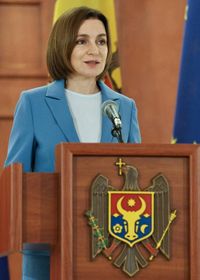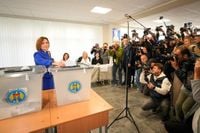On September 28, 2025, the people of Moldova headed to the polls for what many described as the most consequential parliamentary election in the country’s recent history—a contest that, according to Associated Press and Euromaidan Press, was as much about Moldova’s future as it was about the candidates themselves. With the shadow of Russian interference looming large, President Maia Sandu and her pro-European Party of Action and Solidarity (PAS) faced a stark choice: Europe or Putin.
In the end, the result was decisive. PAS secured an absolute majority, winning 55 out of 101 seats in parliament with 50.2% of the vote. This was not just a victory for Sandu’s party, but, as she put it in a post-election press conference, “The results of these elections are not a win for one party, but for the country. I am glad that our path toward the EU is guaranteed. I wanted Moldovans to make this choice themselves, for Moldova to remain free and democratic.”
The stakes were high. Moldova, a small nation sandwiched between Ukraine and Romania, has long been a geopolitical battleground. Since gaining independence from the Soviet Union in 1991, it has struggled to shake off the influence of Moscow while forging closer ties with the European Union. In 2022, Moldova became an EU candidate country, and PAS’s 2025 victory is widely interpreted as a strong mandate to continue that journey, with hopes of signing an accession treaty by 2028.
The run-up to the election was anything but calm. Reports from Euromaidan Press detailed a massive $180 million Russian operation designed to sway the vote through a combination of vote-buying, cyberattacks, and relentless disinformation campaigns. Authorities responded forcefully: dozens of vote-buying coordinators were arrested, and bank accounts linked to the scheme were frozen. More than 138,000 people—roughly 10% of the electorate—were targeted by these efforts, but the crackdown had a clear effect. In traditionally pro-Russian regions like Gagauzia, turnout dropped by 3-4% compared to previous elections, as paid voters stayed home and genuine voters made their voices heard.
Sandu, who was born in 1972 and has a background that spans from the Moldovan Ministry of Economy to Harvard University and the World Bank, has built her career on reform and transparency. After serving as education minister and briefly as prime minister, she founded PAS in 2016 to challenge what she called a kleptocratic political class. Her rise to the presidency in 2020 and re-election in 2024 were seen as turning points, but this latest parliamentary win cements her position. As Siegfried Muresan, chair of the European Parliament’s Moldova delegation, told AP, “The party that she founded less than 10 years ago has become … the most successful democratic party in Europe currently ... She managed to explain to the people in the country what was at stake.”
The campaign itself was marked by existential urgency. PAS’s slogan, “There won’t be a second round,” was less about the mechanics of voting and more about the message that the country’s European path could disappear under Russian pressure if Moldovans did not act. The tactic worked: voter turnout rose from 48% in 2021 to 51.9% in 2025, with fence-sitters choosing sides in what felt like a battle for Moldova’s soul.
Yet, the pro-European camp was not monolithic. The Alternativa bloc, a newcomer with roots in pro-Russian networks but now declaring support for EU integration, secured eight seats. Its ambiguous positioning—tied to figures like Chișinău mayor Ion Ceban, who has maintained links with Moscow—raises questions about whether it represents genuine pro-European politics or simply a tactical rebranding. Still, Alternativa’s formal support for EU integration further tilted the parliamentary balance toward Europe.
Meanwhile, the Kremlin-backed Patriotic Bloc, which includes the Socialist Party of former president Igor Dodon, the Communist Party, and the “Future of Moldova” party, took 26 seats with 24.17% of the vote. Their campaign, however, was hampered not only by the crackdown on vote-buying but also by the exclusion of four parties linked to fugitive oligarch Ilan Shor. These parties were banned for illegal foreign funding and election law violations, a move that opposition figures decried as undemocratic but which Moldova’s Central Election Commission and Constitutional Court defended as necessary to uphold the law and the constitution.
Russian interference took many forms. According to Euromaidan Press, not only did authorities document direct cash payments to voters—especially in rural areas and Gagauzia—but there were also cyberattacks and bomb threats aimed at disrupting the vote, particularly at diaspora polling stations across Europe and the United States. Despite these efforts, the diaspora turned out in force, with 78.6% casting their ballots for PAS. In Russia, where only two polling stations were opened, just over 4,000 Moldovans voted—far fewer than the “hundreds of thousands” alleged by the Kremlin to have been disenfranchised.
Sandu’s victory came despite a torrent of personal attacks and misinformation. Ahead of the vote, fake news stories and viral social media campaigns sought to discredit her by targeting her personal life and weaponizing gender stereotypes. Reset Tech, a not-for-profit tracking Russian disinformation, noted that these tactics were designed to erode her political reputation, but, as political analyst Ion Tabarta observed, “They tried to spread a lot of misinformation about her … It didn’t catch on.”
Opposition leaders, including Dodon and Russia’s Foreign Minister Sergey Lavrov, were quick to allege fraud and manipulation. Dodon claimed that PAS used administrative resources to remove opponents from the ballot and blocked “hundreds of thousands” from voting, calling the result a “direct testimony of the distrust of the citizens who live here and face real problems every day.” Lavrov, speaking from Sochi, echoed these claims, calling the elections “fraudulent.” Yet international observers reported no systemic irregularities, and PAS’s margin of victory was clear.
Europe’s response was swift and unified. Leaders from the European Commission, European Council, France, and Ukraine all congratulated Sandu and Moldova on what they called a triumph of democracy over Russian destabilization efforts. Ukrainian President Volodymyr Zelenskyy wrote, “These elections have shown that Russian destabilization efforts are losing, while a European Moldova is winning. Russian subversive activities, constant disinformation – none of this has worked.”
One surprise from the election was the entry of the nationalist Democracy at Home party, which cleared the 5% threshold to win six seats. Linked to Romania’s far-right AUR movement and known for its mastery of TikTok, the party’s disruptive style could complicate coalition-building and, some analysts worry, provide Moscow with indirect leverage in parliament.
For now, though, Sandu’s renewed mandate secures continuity for Moldova’s European ambitions. With EU accession talks launched in 2024 and a stable parliamentary majority, Moldova stands poised to deepen its ties with Europe—despite, or perhaps because of, the immense pressure it faces from the East. The message from voters was unmistakable: Moldova’s future lies with Europe, not Moscow.



